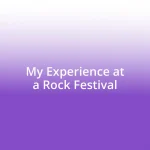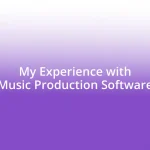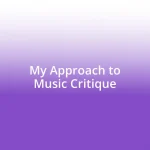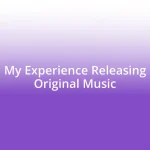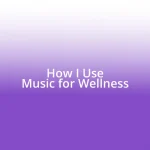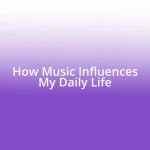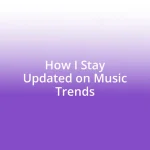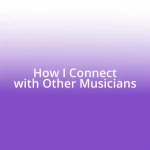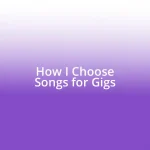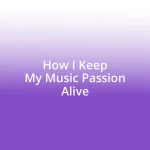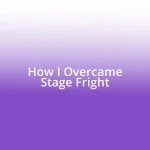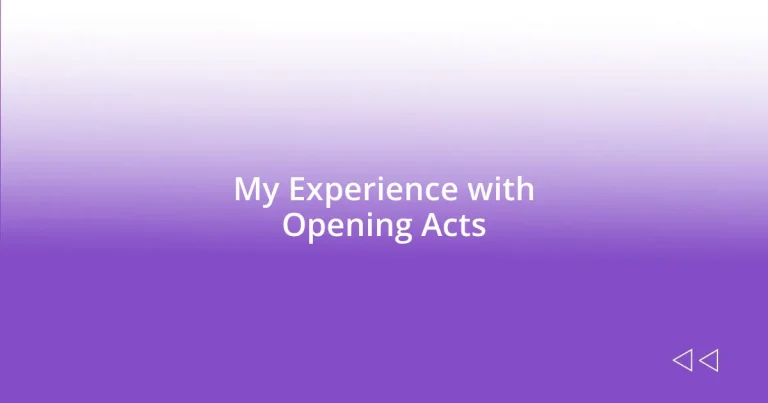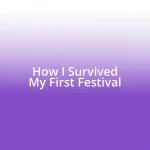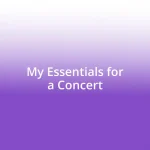Key takeaways:
- Opening acts provide exposure for emerging artists and can significantly set the tone for headliners.
- Preparation involves not just practicing songs, but also adapting to audience vibes and grounding emotional energy.
- Facing challenges, like audience indifference and technical issues, fosters resilience and adaptability in performances.
- Building community and connecting authentically with the audience are crucial for lasting impact as an opening act.
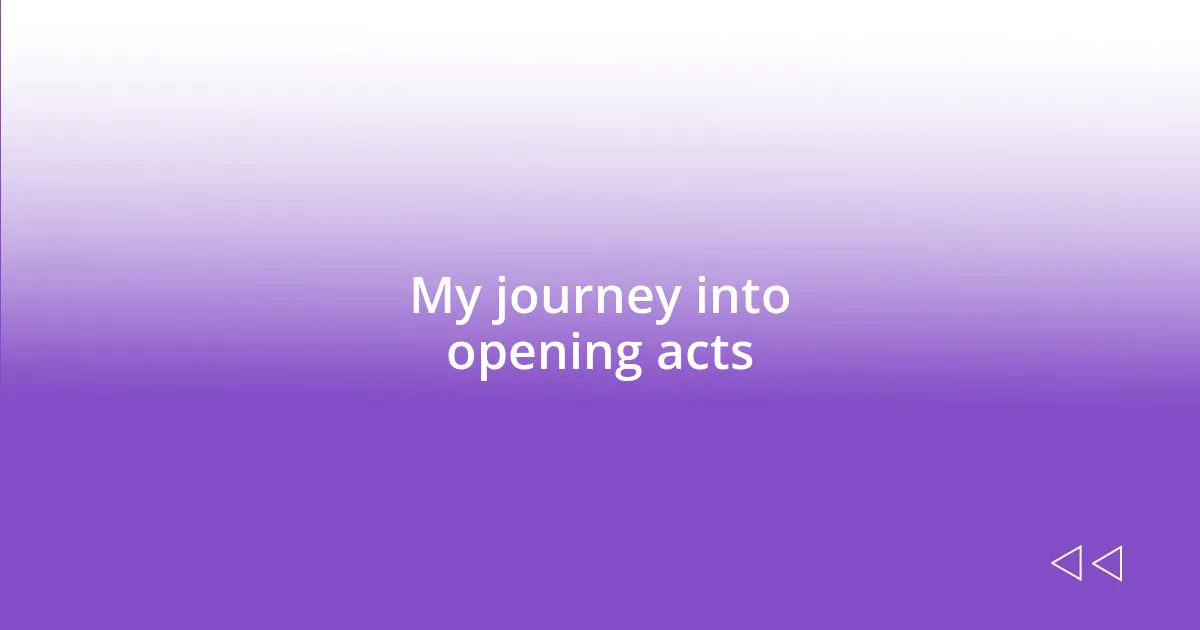
My journey into opening acts
My journey into opening acts began almost by accident. I remember standing backstage at a small venue, adrenaline coursing through me as I prepared to take the stage for the first time. What struck me was the energy in the room; it was electric, filled with anticipation, and I realized I craved that feeling more than anything.
There was one particular night that stands out, where I was the opening act for a band I admired deeply. I recall the moment I stepped out under the bright lights. My heart raced as I faced an audience that had come to hear someone else perform. At that moment, I felt a mix of excitement and fear—was I good enough to capture their attention? But then, when I saw a few heads nodding along to my music, that doubt began to melt away.
With each performance, I found myself learning and growing in ways I never expected. Opening acts have a unique opportunity to set the tone, and I cherished experimenting with different styles and connecting with an audience that was often unfamiliar with my work. Have you ever felt that nerve-wracking thrill of being the underdog? It’s exhilarating, even if it’s daunting at times. Each show was a new canvas, and I learned to paint my story amid the shadows of headliners.
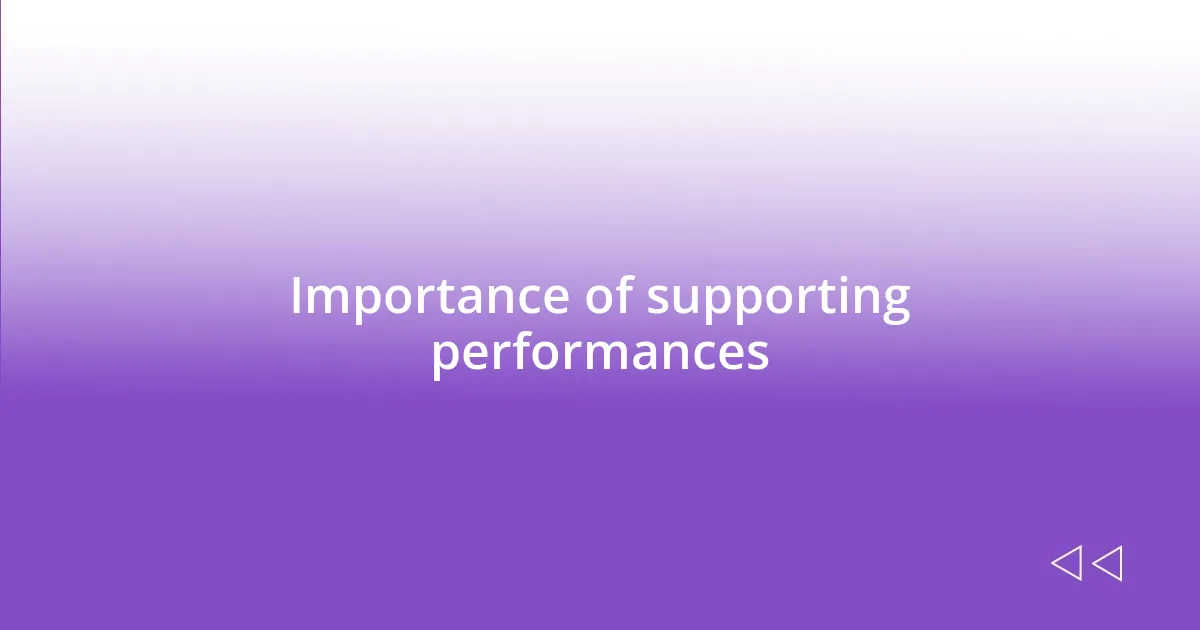
Importance of supporting performances
Supporting performances play a crucial role in the music scene. I’ve seen firsthand how a talented opening act can change the audience’s mood, setting the stage for the headliner in a way that few can. When an opener captivates the crowd, it not only warms them up but also creates a sense of connection that enriches the entire experience for everyone in the room.
- They provide exposure for up-and-coming artists, increasing their chances of getting noticed.
- A strong opening act can enhance the overall event atmosphere, adding excitement.
- They allow the headlining artists to gauge audience reactions, shaping their own performances.
- Supporting performances often include diverse styles, introducing the audience to fresh music and voices.
I remember a night when I was blown away by an opening act’s unique sound — it made me rethink my own music. That unexpected twist in my evening sparked new inspiration and reminded me that every performance is an opportunity, not just for the artists on stage but also for the listening audience.
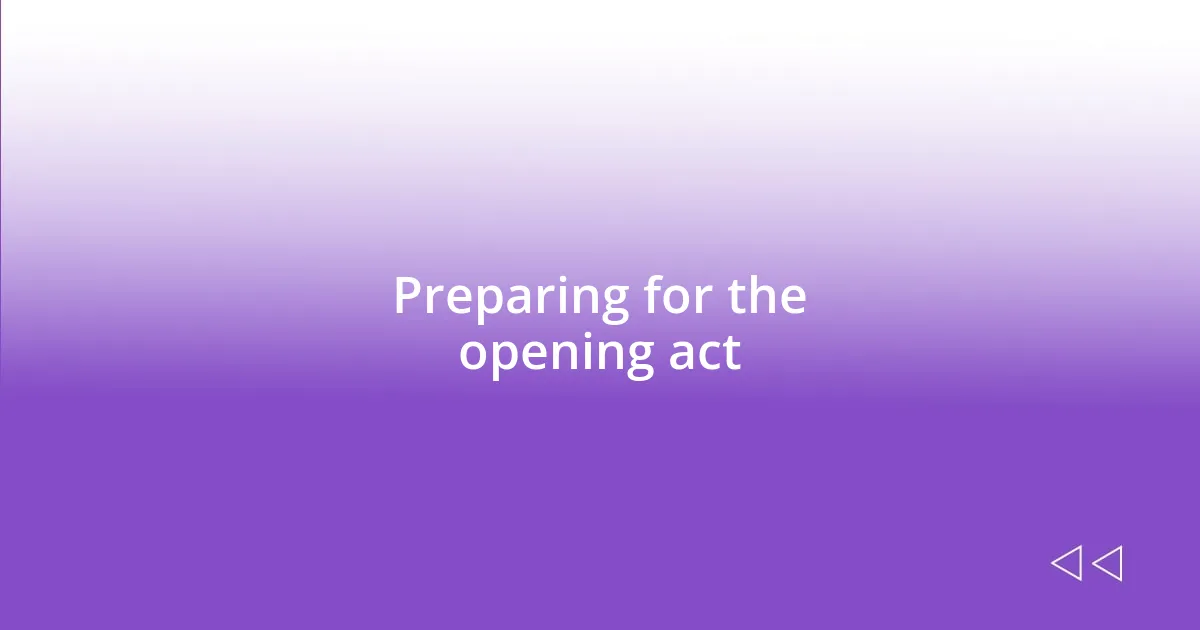
Preparing for the opening act
Preparing for an opening act involves more than just memorizing your setlist. I remember spending hours before shows fine-tuning my performance, focusing on the little details that mattered most, like transitioning between songs and engaging with the audience. It’s all about creating an experience that resonates, and I learned that practicing in front of friends helped me gauge what worked and what didn’t.
In contrast to preparing for a regular gig, opening acts often require a quick adaptation to different venues and audiences. I vividly recall a night when the venue had a surprisingly intimate vibe compared to the usual rambunctious crowds. I adjusted my set on the fly, stripping it down to a few heartfelt acoustic numbers that ultimately connected more profoundly with the audience. This flexibility is essential and has taught me to read the room and respond accordingly — a skill I continue to hone.
Lastly, there’s an emotional component to preparation that can’t be ignored. Before each show, I recall the familiar flutter of nerves in my stomach, which often shifted into excitement as I stepped onto the stage. It was like a rollercoaster ride — thrilling and terrifying all at once. Grounding myself with deep breaths and a moment of reflection has been key in channeling that energy into a performance that I cherish, aiming to leave a lasting impression on the audience.
| Preparation Aspect | Importance |
|---|---|
| Setlist Arrangement | Helps in engaging the audience effectively |
| Adaptability | Allows for real-time adjustments based on the vibe |
| Emotional Grounding | Converts nerves into a powerful performance |
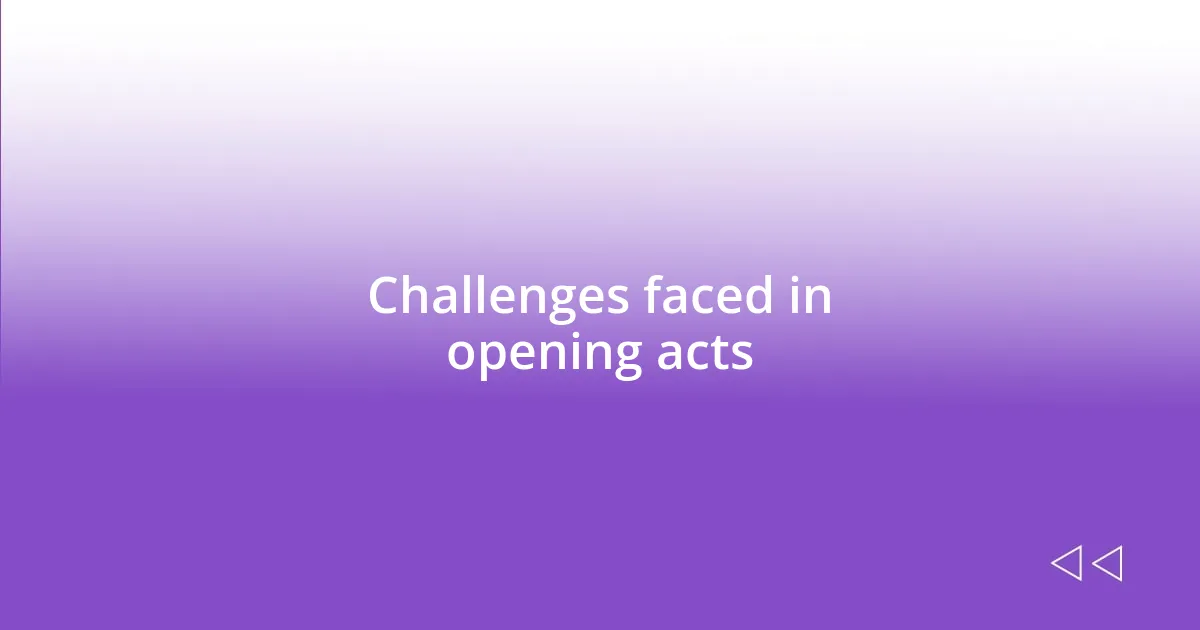
Challenges faced in opening acts
Facing the challenges of being an opening act can be incredibly daunting. I once played in front of a crowd that was clearly there for the headliner, not me. That realization hit hard; the audience’s indifference is a tough pill to swallow, making it even more critical to grab their attention quickly. How do you turn such uncertainty into a captivating performance?
Technical difficulties are another hurdle that often clouds the experience. I remember a gig where my microphone cut out mid-song, leaving me standing awkwardly on stage. The anxiety surged as I had to think fast—should I keep singing or acknowledge the issue? In that moment, I learned the importance of maintaining composure and interacting with the crowd to keep the energy alive. These unexpected situations can be nerve-wracking, but they also teach invaluable lessons about resilience and adaptability.
Additionally, the pressure of standing in the shadow of more established acts can be stifling. I felt it intensely when I opened for a band I had long admired. I questioned whether I belonged on that stage at all. Yet, I transformed that pressure into motivation, pushing myself to deliver a performance that would resonate. While it’s easy to compare yourself to others, I find that focusing on your unique strengths is the key to overcoming those self-doubts. How do you channel that nervous energy into something powerful? For me, it became a driving force to connect authentically with the audience—it felt like I was laying a piece of my heart out there.
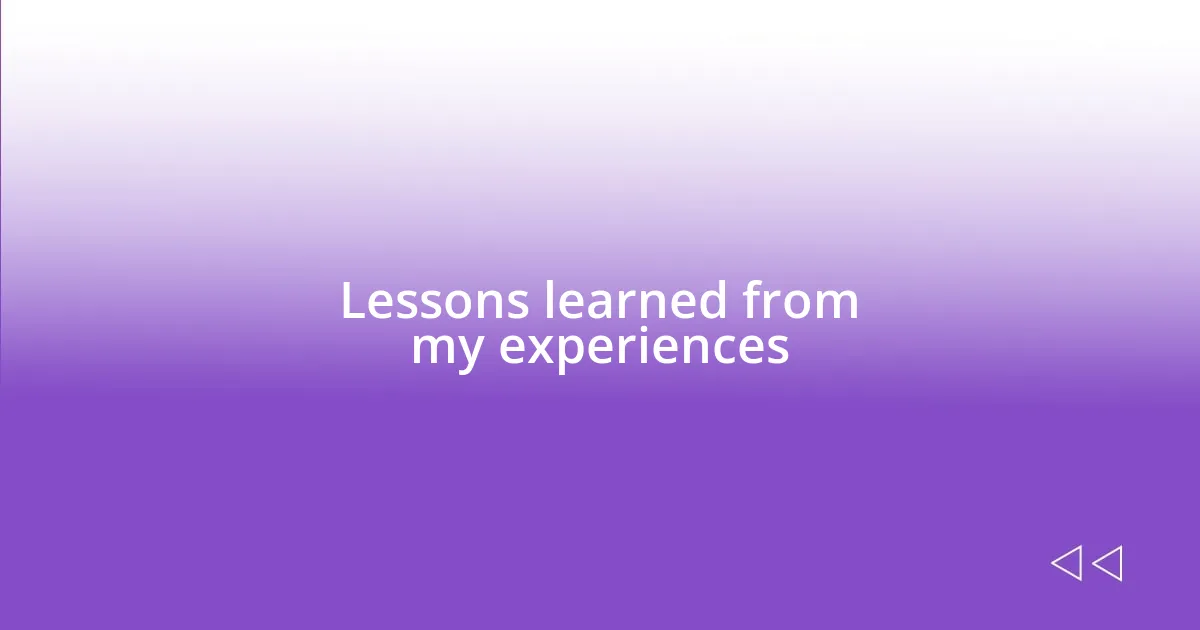
Lessons learned from my experiences
Through my journey as an opening act, I’ve realized that every performance is an opportunity to learn something new. I remember one night when I tried out a new song that I was unsure about. The moment I strummed the first chord, I noticed some heads bobbing in the crowd, and that instant feedback taught me the value of experimenting. It’s exhilarating to explore uncharted territory, and sometimes, the most unexpected moments can resonate the loudest.
Another lesson emerged from the countless times I’ve seen other acts go on before me. It struck me how the stage presence of a performer can electrify a room or dim the lights of anticipation. One particular night, an opening band played before me, and their infectious energy transformed a reluctant crowd into a sea of cheers. That experience taught me that engagement is key. Addressing the audience directly, sharing a story or a laugh, can break down barriers and create a connection that makes you memorable.
Finally, I’ve come to appreciate the importance of community among opening acts. I recall a moment when I joined forces with a fellow opener to create a mini jam session after our sets. It was spontaneous and truly magical, allowing us to not only support each other but also to share our experiences and challenges. That sense of camaraderie illustrates that we’re all in this together and that building relationships within the music scene is essential. It’s a reminder that the journey is much more enjoyable when you uplift one another.
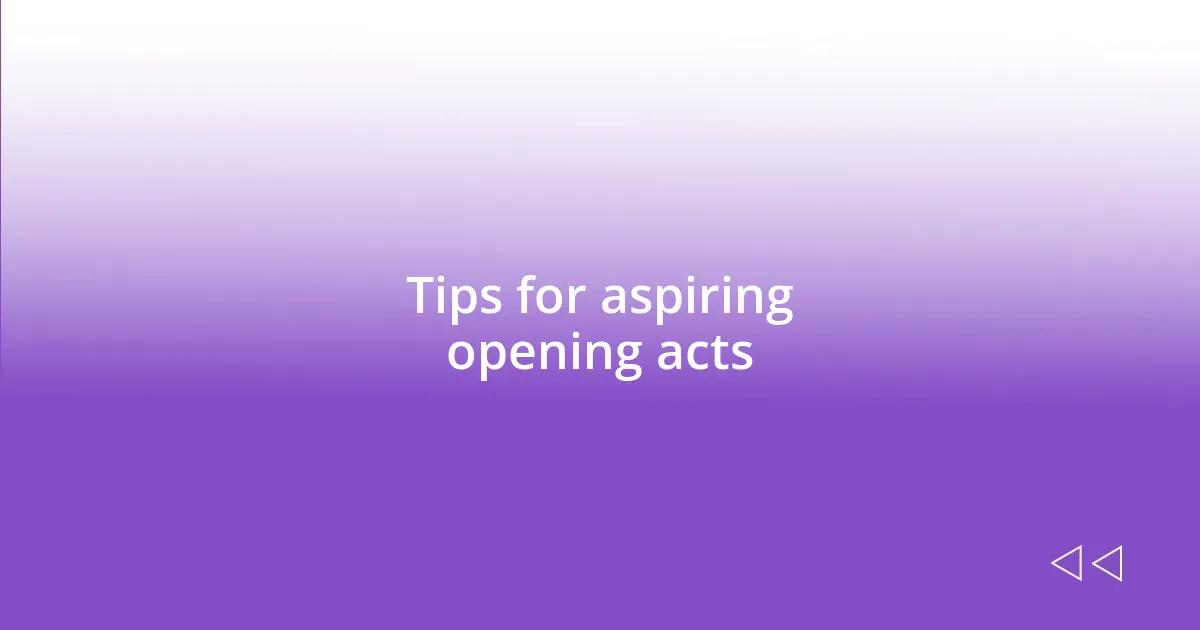
Tips for aspiring opening acts
When you’re stepping into the role of an opening act, one of the most valuable things I’ve learned is the significance of preparation. I can’t stress enough how crucial it is to know your set inside and out. I had a night when I forgot a significant part of a song right in front of an audience; it was such a cringe-worthy moment! Being fully prepared not only boosts your confidence but also allows you to focus on connecting with the crowd instead of worrying about what comes next.
Another tip I found effective is leveraging social media to create a buzz before the show. The energy really hit me one time when I shared behind-the-scenes content leading up to a gig, and it drew more fans out to see me perform. Engaging your audience beforehand makes them feel invested in your journey. Have you thought about how you can bring them along for the ride? It truly amplifies the experience for everyone involved when you create a sense of anticipation.
Lastly, I believe embracing vulnerability can be your secret weapon on stage. One of my most memorable performances was when I shared a personal story about a challenge I faced as a musician. The rapport with the audience shifted; they could feel my authenticity. It was as if we all connected on a deeper level, turning a simple performance into a shared experience. How might your own stories resonate with the crowd? Trust me, being sincere can echo louder than the music itself.
